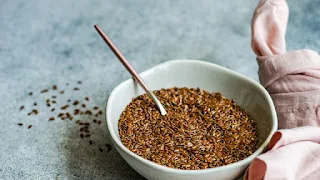A recent study shows that lignan compounds found in flax seeds may help reduce the risk of breast cancer by altering the human gut microbiome.
It has long been known that lifestyle and diet affect human health. In the study published in the journal Microbiology Spectrum, researchers found that flaxseed affects the relationship between microorganisms in the intestine and the expression of microRNA (microRNA or miRNA) in the mammary gland that regulates genes that control breast cancer cell growth and migration.
Researchers in Nebraska and Canada gave female rats a solution of flaxseed oil, which contains lignans, a compound found in foods rich in fiber, such as: grains, seeds, and nuts, and drinks, such as coffee.
They found that it triggered a relationship between the gut microbiome and mammary gland microRNAs (miRNA), which are linked to breast cancer cell growth.
Rodents given flaxseed oil were less likely to develop breast cancer.
The researchers said these findings could lead to new dietary recommendations for breast cancer prevention.
“If these findings are confirmed, the microbiota becomes a new target for breast cancer prevention through nutritional intervention,” explained Dr. Elena M. Comelli, study author and assistant professor in the Department of Nutritional Sciences at the University of Toronto.
Previous research has shown that lignan compounds have anti-inflammatory properties and cause the body to produce less estrogen, leading to a lower risk of breast cancer.
Places that threaten women with a 30% risk of breast cancer!
The researchers fed female mice a solution of lignans from flaxseeds for three weeks, and found that it triggered a reaction in the cecum, the sac inside the peritoneum, which separates the small and large intestines.
When flaxseeds enter the gut microbiome, a network of bacteria that live in the digestive system and help us fight infections and regulate appetite, they send signals to microRNAs in the mammary glands, which leads to a reduced risk of breast cancer cells.
“The microorganisms in the digestive tract play an important role in modifying many components of our diet to impact human health,” said Dr. Jennifer Ochtung, an assistant professor at the University of Nebraska-Lincoln.
“In this study, we found associations between flaxseed-rich diets, cecal microbiota composition, and microRNA profiles in the mammary gland that regulate several pathways, including those associated with cancer development,” she added.
She continued: “This preliminary study supports further research into the role that microorganisms play in dietary approaches to reduce risk factors associated with disease.”
Lignans have been shown to cause women who have gone through menopause to produce less active forms of estrogen, which is thought to reduce the risk of breast cancer.
Other grains, such as: barley, buckwheat, millet, oats, and wheat also contain high levels of lignan compounds. It is also abundant in other nuts and seeds, as well as beverages such as coffee, tea, and wine.
The new study confirms other recent findings that indicate that flax seeds reduce the risk of cancer.
Some research has also indicated that flax seeds reduce the growth rate of prostate cancer cells.
It has also been proven that flax seeds treat digestive disorders, such as constipation, and reduce harmful cholesterol (LDL), which reduces the risk of diabetes and heart disease.
Flax seeds are rich in polyunsaturated fats, fiber, manganese, magnesium, zinc, vitamin B6, iron and folate, all of which improve metabolism, digestion and immune health.
The researchers warned that the results of the recent study are preliminary, and that more research is needed.


Good
ReplyDelete